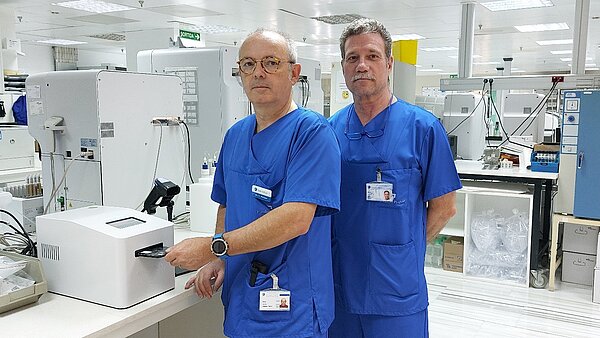- Urinary tract infections (UTIs) are a significant public health problem, especially among women, as it is estimated that half of them will suffer from a UTI at some point in their lives.
- The new Sysmex PA-100 AST System can identify the most suitable treatment and is an effective tool in fighting against antimicrobial resistance.
- This new tool has been validated in clinical practice for the first time by the Spanish medical centre Fundació Puigvert.
- The high prevalence of UTIs among the Spanish population underlines the need for quick and precise diagnostic methods.
Dr Carles Alonso-Tarrés, head of the Microbiology Laboratory of Fundació Puigvert in Barcelona, in collaboration with Dr Jaume Borràs, clinical head of the Emergency Department of Fundació Puigvert, led this study in collaboration with their counterpart departments at the Hospital de Sant Pau and the company Sysmex Europe SE, including Sysmex Astrego, which developed the technology.
“We cannot forget that UTIs are one of the most common infections in humans and one of the main causes of antimicrobial resistance, so tools like this are a very significant breakthrough”, notes Dr Alonso-Tarrés, who emphasised the serious public health problem posed by multi-resistant strains, which already account for 15% of the strains seen in clinics.
Published in the European Journal of Clinical Microbiology & Infectious Diseases1, the study compared the results of the Sysmex PA-100 AST with routine microbiology methods in 278 female patients with suspected uncomplicated UTIs. “The results show that this new tool produces bacteriuria results within 15 minutes and AST results within 45 minutes, with a sensitivity of 84% and a specificity of 99.4% for bacterial species within the analyser's specifications, which are common species that cause uncomplicated UTIs”, comments Dr Alonso-Tarrés.
Specifically, the analyser is designed to identify the following bacteria: Escherichia coli, Klebsiella pneumoniae, Proteus mirabilis, Enterococcus faecalis and Staphylococcus saprophyticus. From there, the system studies resistance or susceptibility to five antimicrobials: amoxicillin/clavulanic acid, ciprofloxacin, fosfomycin, nitrofurantoin and trimethoprim. The study results confirm that the rapid test provides an optimal treatment recommendation in 80% of cases, thereby reducing the prescription of broad-spectrum antibiotics. The remaining 20% of cases will be resolved in the same way as before, based on the medical assessment of each patient.
More effective than empirical treatments
Empirical prescribing is an approach whereby physicians prescribe antibiotics based on experience and common infection patterns, without waiting for microbiological culture results. This method is essential in most cases to protect the patient from potential infection complications. However, in some cases, it can lead to the use of antibiotics being ineffective. On top of that, by having to use broad-spectrum antibiotics, it can contribute to an increase in antimicrobial resistance, one of the greatest global public health challenges.
“Until now, one of the main obstacles in managing UTIs was that the cultures needed to determine the most suitable antibiotic take two to four days. This is too long, and in this time, a patient’s condition can worsen significantly, forcing specialists to use empirical prescribing”, says Dr Jaume Borràs, clinical head of the Emergency Department at Fundació Puigvert, who stresses that the new tool could represent an important paradigm shift in the treatment of this type of infection.
A significant public health problem
Urinary tract infections are one of the most common bacterial infections worldwide, with more than 400 million cases each year. In Spain, UTIs are one of the most frequent bacterial infections in primary and hospital care. According to the EPINE 22 report, in primary care alone approximately 30% of consultations are for infections, of which around 10% are urinary tract infections.2
These types of infections are more common in women who are sexually active, and it is even estimated that half of all women will get a UTI during their lifetime. In Spain alone, around four million women between 20 and 44 years of age develop acute cystitis each year.3 The high prevalence of UTIs in the Spanish population highlights the need for quick and precise diagnostic methods to improve patient care and reduce the burden on the health system.
The World Health Organisation (WHO) has stressed that antimicrobial resistance threatens our ability to treat common infections, leading to longer treatments, longer hospital stays and an increased risk of mortality. In response, health systems have been urged to optimise the use of antimicrobial agents and invest in new diagnostic tools that allow for targeted and effective treatment from the outset.
Combating antimicrobial resistance
The Sysmex PA-100 AST System has emerged as an innovative solution to this problem. Designed predominantly for use in primary care and emergency settings, the PA-100 uses fresh urine samples and provides quick and precise results. Its advanced nanofluidic technology and contrast phase microscopy enable the detection of common UTI-causing bacteria and the performance of AST tests in record time.
“With the PA-100 AST System, Sysmex is responding to a diagnostic need that can have a major impact given the high incidence of UTIs. For the first time, a patient experiencing an uncomplicated UTI can receive a specific antibiotic treatment based on a diagnostic test in less than an hour during their first visit to the doctor. This is not only beneficial for the patient suffering the infection, but potentially also beneficial for public health”, points out Dr Francisco Blanco, Product Manager at Sysmex Europe SE.
The value of this new tool was recently recognised by Challenge Works, a UK-based innovation agency, who awarded it their Longitude Prize worth GBP 8 million, created to tackle antimicrobial resistance. The prestigious journal The Lancet4 also dedicated one of its editorials to it, noting the importance of this innovation in transforming the way we deal with antimicrobial resistance.
About Fundació Puigvert
Fundació Puigvert is a monographic medical institution specialized in Urology, Nephrology, Andrology, and Reproductive Medicine, founded in 1961 by Professor Antoni Puigvert i Gorro, with the aim of being a reference of excellence in these specialties.
Currently, as a university hospital centre, privately managed and non-profit, it deals with the study and medical and surgical treatment of pathologies and dysfunctions of the urinary system and genital apparatus, highlighting its high expertise in the implementation of robotic surgery applied to Urology and renal transplants.
Thanks to its long history and the value of a highly specialised medical team with extensive medical, surgical, teaching, and scientific experience, Fundació Puigvert is one of Europe’s health centres with the highest volume of specialised care activity and clinical excellence in Urology, Nephrology, and Andrology. Each year, an average of 5,500 surgeries and around 90,000 medical visits are performed.
Fundació Puigvert is not only committed to comprehensive, effective, and personalised care for patients, but also promotes the development and scientific knowledge of these disciplines through research, training, teaching, dissemination, and health education activities, and is currently a national and international reference centre.
About Sysmex
Sysmex supports healthcare professionals and patients around the world with a broad range of medical diagnostics products and solutions in a variety of fields. With over 50 years’ experience in in-vitro diagnostics, we are continuously developing our product and service portfolio to cover the entire patient pathway of care. Our multi-functional solutions work together with high-quality reagents and reliable service and support to create a better healthcare journey for all.
Sysmex Europe SE, located near Hamburg, Germany, is a subsidiary of the Sysmex Corporation from Kobe, Japan. From our Hamburg offices, we serve our affiliates, distributors and customers throughout Europe, the Middle East, and Africa (EMEA). For more Information, visit www.sysmex-europe.com.
Sysmex España S.L. is a subsidiary of Sysmex Europe SE. Founded in 2010, the Spanish subsidiary is a benchmark within the group in the field of Life Science, the core business line at the time of its foundation. Sysmex España currently has more than 150 employees and has expanded its activity into new diagnostic fields, including haematology. For more information, visit www.sysmex.es.
References
1 Alonso-Tarrés, C., Benjumea Moreno, C., Navarro, F., Habison, A. C., Gonzàlez-Bertran, E., Blanco, F., Borràs, J., Garrigó, M., & Saker, J. (2024). Bacteriuria and phenotypic antimicrobial susceptibility testing in 45 min by point-of-care Sysmex PA-100 System: first clinical evaluation. European Journal of Clinical Microbiology & Infectious Diseases: Official Publication of the European Society of Clinical Microbiology, 43(8), 1533–1543. https://doi.org/10.1007/s10096-024-04862-3
2 EPINE (Estudio de Prevalencia de Infecciones Nosocomiales en España [Prevalence Study of Nosocomial Infections in Spain]) Working Group of the SEMPSPH. EPINE Study - EPPS no 32: 2022. Overall report for Spain. Spanish Society for Preventive Medicine, Public Health and Hygiene (SEMPSPH, Sociedad Española de Medicina Preventiva, Salud Pública e Higiene). Available at: https://epine.es/api/documento-publico/2022%20EPINE%20Informe%20Espa%C3%B1a%2020221201.pdf/reports-esp
3 Zboromyrska Y, de Cueto López M, Alonso-Tarrés C, Sánchez-Hellín V. 2019. 14b. Microbiological diagnosis of urinary tract infections. Spanish Society of Infectious Diseases and Clinical Microbiology (SEIMC, Sociedad Española de Enfermedades Infecciosas y Microbiología Clínica). 2019. Available at: https://seimc.org/contenidos/documentoscientificos/procedimientosmicrobiologia/seimc-procedimientomicrobiologia14b.pdf
4 The Lancet Global Health. (2024). Navigating AMR with innovative diagnostics. The Lancet. Global Health, 12(8), e1214. https://doi.org/10.1016/s2214-109x(24)00285-7


